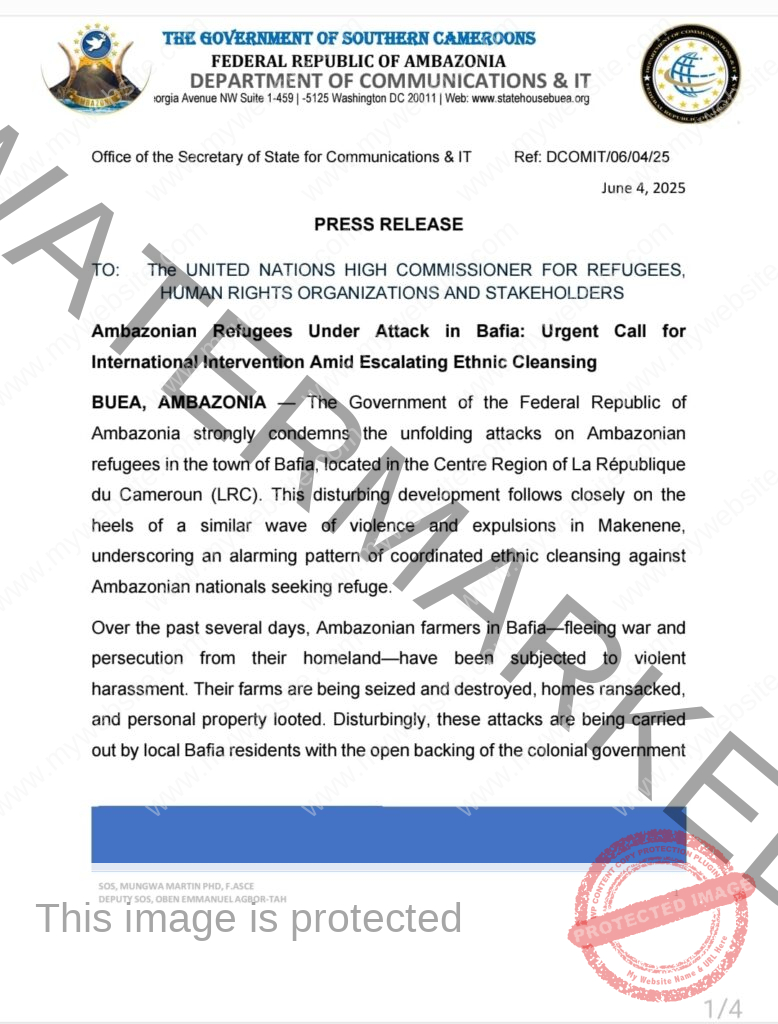By Staff Correspondent | BUEA, AMBAZONIA
A humanitarian crisis is unfolding in the Centre Region of Cameroon, where refugees from the English speaking war torn region, are reportedly facing violent attacks, forced evictions, and destruction of property in the town of Bafia. The Ambazonian government-in-exile has described the situation as “an alarming escalation of ethnic cleansing,” urging the international community to intervene before the violence spirals further out of control.
The latest wave of attacks appears to be targeting Ambazonian farmers who had sought refuge in Bafia after fleeing the ongoing armed conflict in their home regions. Over the past week, eyewitnesses have reported that local Bafia residents—allegedly acting with the tacit support of Cameroonian security auxiliaries—have seized farmland, ransacked homes, and issued threats to Ambazonian refugees, demanding that they “return to their country.”
Footage and audio recordings circulating on social media show scenes of harassment and violence, sparking outrage among Ambazonian communities and human rights advocates. The incidents follow a similar pattern of aggression recently observed in the nearby town of Makenene, leading observers to fear a coordinated campaign of ethnic persecution against Ambazonian nationals across the region.
“The silence of the Cameroonian authorities is deafening,” said a spokesperson for the Department of State for Communication and Human Rights of the Federal Republic of Ambazonia. “What we are witnessing is not random xenophobia, but an organised effort to terrorise a people already displaced by war. This is a systemic attempt at ethnic cleansing—conducted in plain sight and met with international indifference.”
The Ambazonian government-in-exile has issued an urgent appeal to the African Union, United Nations, and international human rights bodies to take immediate action. Among their key demands are the deployment of a fact-finding mission to assess the situation on the ground, protective relocation for vulnerable refugee families, and international pressure on Cameroon to end the violence.

They are also calling for accountability measures to be taken against local and state officials implicated in enabling or perpetrating the attacks.
“These are not just attacks on people—they are attacks on humanity and dignity,” the Ambazonian spokesperson continued. “If the world continues to look away, we risk witnessing the slow-motion continuation of a silent genocide.”
The crisis is part of a broader, long-standing conflict between the Anglophone regions of Cameroon—commonly known as Southern Cameroons or Ambazonia—and the Francophone-dominated government in Yaoundé. Since 2017, the Ambazonian independence movement has sought to break away from what it views as decades of marginalisation and colonial-style rule. The Cameroonian government, meanwhile, has labelled the separatists as terrorists and responded with military force, leading to thousands of deaths and the displacement of over a million people.
As the humanitarian fallout spreads beyond Ambazonia into other regions of Cameroon, the calls for international intervention are growing louder.
“The question is not whether the world knows,” said one displaced Ambazonian farmer from Bafia, speaking anonymously for fear of reprisal. “The question is whether the world cares.”